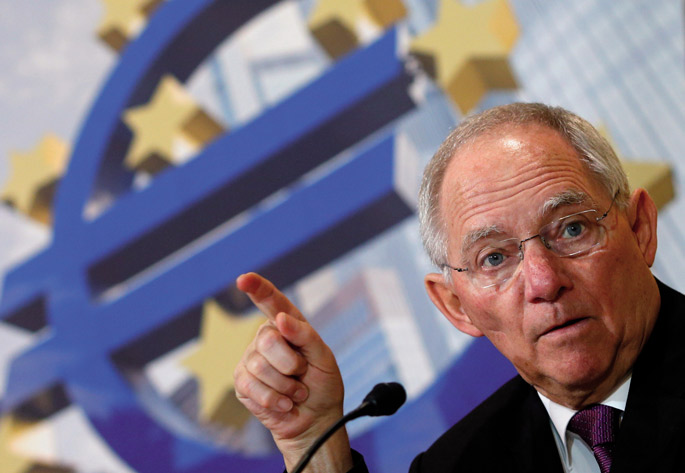- No to the Health Strike! do not condemn the Greeks to death without money
- When the economic policy imposed by the European oligarchy has sunk through its cuts the public health system in Greece to the level of the Third World, thousands of doctors, carers and citizens of all classes are striving to care for people excluded for lack of money. Your solidarity extends throughout Europe from the Health Strike no! Campaign.

“What I’ve seen at the public hospital in Thessaloniki has frightened me, I didn’t expect to find the health system so devastated,” said Yvon Englert, former head of gynecology and university professor at the Erasme hospital in Brussels. “The directors of the clinics, meeting each week with other leaders, decide what products they will not have for patients that week.”
The head of the solidarity centre Englert Urgences Grece visited Greece last summer, where he has been detained for several weeks. During his stay in Thessaloniki, he has seen that for three days all the surgeries that needed blood were paralyzed: a hospital that did not have a product to test hepatitis and AIDS in its blood... “The hospital workers have had to work in a situation in the Third World, but without preparing to do so. Tears tell you their impotence and the despair that everyone is forgotten.”
You can read it in the blog Urgences Grece: “In the cradle of European civilisation, three million citizens do not have access to health services. The infant mortality rate has doubled since 2008. It seems incredible that this happens in our modern Europe, which has as one of its pillars access to social security and health services for all.”
No to the Health Strike! They have launched a campaign to call on the European authorities to ensure that these fundamental rights are also respected in Greece and to do so they want to put in place a concrete measure: that the health system is shielded in any budget and economic programme, at least guaranteeing the situation before the 2008 crisis. Going back to health services in 2008... although it seems little to say, today in Greece it is a lot to ask.
The leader of the Greens in the European Parliament, Rebecca Harms, delivered in Athens in June to Prime Minister Alexis Tsipras, a letter summarising the dramatic situation. Since the troika imposed the first memorandum on Greece in 2010 on how to channel its debt, there has been a drastic cut in money and staff to the health system.
In 2009, Basque health accounted for 7% of Gross Domestic Product (GDP) on the same average as European countries, and is currently down to 3.5% to 4%. Hospitals spent EUR 2 billion in 2012, last year 1.3 billion and this year 1.160 million...
The humanitarian crisis has begun to be seen in Greece since 2013, when the humanitarian crisis has erupted throughout the country. The infant mortality rate has increased between 2.7 and 4 per cent in 2012. Over the past two years, the number of births has decreased by 2.1 per cent, while deaths have increased by 1.17 per cent.
Among diseases, between 2009 and 2015 infarctions have increased from 1.4% to 2%, diabetes has increased from 7.9% to 9.2%, depressions have increased from 2.6% to 4.7%.
A study by the Institute for Disease Prevention last year showed that one in four patients who need a medicine on a daily basis has reduced the purchase of remedies for difficulties in paying them. One in five has completely abandoned all medicines, because they cannot be paid.
The cut in budgets has plunged public hospitals into a shortage of equipment and personnel. Some are sent material by humanitarian clinics organized with international assistance. Patient waiting lists have been lengthened dramatically. People with cancer should wait 4 to 5 months to get radiation therapy, which greatly increases the chance of death.
The report acknowledges to the Syriza Government the efforts it has made during these months, but adds that the results have not yet been seen. The priority now is to get the Greek health system out of the budget cuts programmes, the minister said.
Paying or dying the healing
The letter from the European Greens to Tsipras was signed by cardiologist George Vichas. Vichas is the founder of the auzolan hospital MCCH Metropolitan Community Clinic in the city of Hellini. Just like MCCH is doing in Hellinico with 8 smaller outpatient clinics in the neighborhoods, throughout Greece there are 50 others who treat people for free among volunteer doctors, nurses and many other citizens.
Vichas works on pay and out of time at a public hospital at MCCH. Tiring activity that requires a good physical form and shows a great deal about the crisis and the cuts: “For a year now, my daughter no longer asks me when the crisis is going to end.”
Like many other doctors, Vichas couldn’t bear seeing the shocks of many sick people who had fallen into poverty, people getting worse and dying for lack of money and means. In August 2011, Vichas was at the concert of Mikis Theodorakis at the abandoned military airport of Hellinico, where he heard the mythical singer asking for help from doctors to help the sick who were left without social security, marginalized from the health system by the restrictions imposed by the Troika.
After requesting authorization from the director of the public hospital where he works, who was also “concerned about the 40% reduction in health budgets and the dismissal of many doctors”, they organized the humanitarian polyclinic with a group of doctors and nurses in the old Hellinico airport.
To the German daily Der Tagesspiegel, Vichas explained that voluntary work is nothing more than patches, a probisional way of alleviating the suffering of people, that the objective is to quickly restore the public health system. And so bad is the public system ... “Last year they worked for months in a hospital in northern Greece without tweezers to tie umbilical cords of newborn children, because they could not buy them.”
Diabetics also suffer a lot from not being able to pay for insulin. The increase in cancer deaths cannot be forgotten, due to the lack of urgency and care of medicines. But in addition, there are three diseases that are the sign of the crisis: AIDS, tuberculosis and hepatitis. Vichas alerts Europe that these infections know no borders.
He disregards Dr Vichas – without forgiving his blame to the previous governments of Athens – the troika memorandum to the Greeks, which explains in detail the cuts in the public health system. “I’ve often wondered why they rape us to cut spending, knowing that they only manage to increase Greece’s debt. In the end I came to the conclusion that in practice they want to impose an ideology that says that those who have money have the right to live and those who do not have money have to die.”
Tsipras has staged this summer in Itaka the end of the financial rescue to Athens via Libya. In the liturgy that was given on 21 August, he solemnly spoke of the end of the modern Odyssey.
Itaka is located on the west coast of the Greek continent, in the Ionian Sea. To the... [+]
Iragan uztailaren 27an, Zabaldiko bi kide, brigada internazionalisten prestakuntza lanean ari ziren Tesalonikan. Hurriyako etxea hustua izan zen eta bi kideak atxilotuak. Urtarrilaren 26an, ostegunean, epaituak izanen dira.
Syrizaren bigarren kongresuan Alexis Tsiprasek ikusmin handia sortu duen hitzaldia egin du. Aurrera begirako politika marraztu du greziar presidenteak. Hibai Arbide kazetariak jarraitu du ekitaldia Twitter bidez.
Ezkerraren itxaropen zaharberrituekin ekin urte berriari eta alde guztietako kontserbadore eta inmobilistek aldarrikatutako Zibilizazioen Talkaren edizio odoltsuekin burutu, horra zein izan den 2015 honen patua. Disney World edo Port Aventurako txirrista erraldoietako batean... [+]
Robotak, terrorismoa, migrazioak edota desoreka sozialak izango dituzte hizpide Davoseko (Suitza) eski estazioan bildu diren agintari politikoek, enpresariek eta Leonardo DiCaprio bezalako hainbat pertsona famatuk. Urtarrilaren 23ra bitartean egingo den Munduko Ekonomia Foroak... [+]
Greziarrek sinetsi zuten Europar Batasunean bazela bestelako politika baterako zirrikitua, botoetan garaipena ezkerrari emanik Syrizak eta Alexis Tsiprasek moztu ahal izango zutela hamarkada luzetako neoliberalismoak eta etxeko ustelkeriak ekarritako odolustea. Gero... [+]
Greziako Metropolitan Community Clinic in Ellinikok errefusatu egin du Europako Parlamentuak emandako Urteko Europako Herritarra saria. Ellinikon aurkitzen den osasun zentroak asistentzia sanitarioaren hedadura galdu duten pertsonak artatzen ditu.
Syriza ezkerreko koalizioak irabazi ditu berriro hauteskundeak Grezian. Demokrazia Berria alderdi kortserbadorea bigarren izan da. Abstentzio oso handia egon da, %45 ingurukoa.
Igandean hauteskundeak izango dira Grezian. Vaigelis Meimarakis Demokrazia Berriaren hautagaia, eta Alexis Tsipras Syrizako buruzagiaren arteko berdinketa aurreikusten dute. ANT1 telebista kate pribatuko estatistikek %31,6ko indarra ematen diete bi alderdiei. Abstentzio handia... [+]
Parisen Alderdi Komunistaren egunkariaren inguruan urtero antolatzen den Fête de l'Hummanité ekitalditik zabaldu da deialdia: Europako ezkerrak B plan bat antolatu eta indartu beharra dauka Europar Batasuna Greziarekin egiten ari dena berriro gerta ez dadin eta... [+]
25 urteko tartearekin, Europa astindu duten bi gertakizun nagusitan protagonista izan da Wolfgang Schäuble ministro alemana. 1990eko hamarkadan Eki Alemania kapitalismoan murgilarazteko operazioa kudeatu zuen. Uda honetan Greziako herritarrei erreferendum itxaropentsu baten... [+]
Europako ezkerrak moneta sistema malguago baten aldeko apustua egin beharko lukeela eta "B plana" garatu beharko lukeela uste du Oskar Lafontaine Alemaniako ezkerreko Die Linke alderdiko presidente ohiak. Gako hauek krisi ekonomikotik irteteko ezinbestekoak liratekeela... [+]
Asteartean sinatutako ebazpenaren arabera, Fraport enpresa alemanak kudeatuko ditu Greziako hamalau aireportu, tartean Salonika hirikoa. Syriza eta Greziar Independenteen Gobernuak erreskate plana sinatu zutenetik lehen pribatizazioa izango da.1.200 milioi euroko balioa izango... [+]
We knew that the European Union (EU), ruled by Germany, did not like the new Syriza government. That it was not going to make things easy for Athens and that it was going to give a smooth, propelled coup d'état in other European countries, imposing change of government. The EU... [+]






















